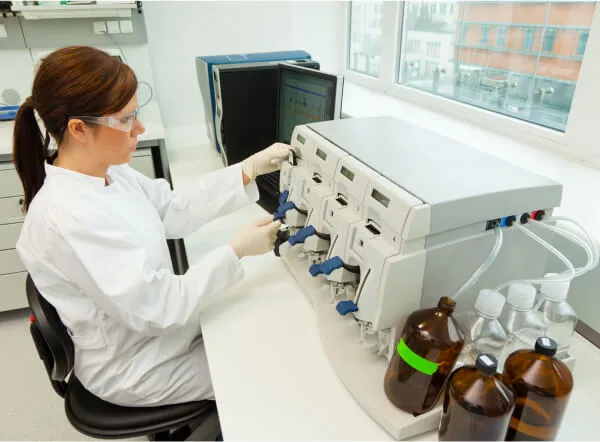Cell and Molecular Biology

Explore careers available in the field of cell and molecular biology, which includes the study of infectious diseases and genetics, and the undergraduate and graduate education required. Learn about employment and salary prospects, too.
<h2 id="section---IsCellAndMolecularBiologyForMe">Is Cell and Molecular Biology for Me?</h2>
<h3 id="section---CareerDescription">Career Description</h3>
<p>Cell and molecular biology is a concentration within the biological sciences field focused on the functions and processes of living organisms at the most basic level. Areas of interest for cell and molecular biologists include infectious diseases and genetics. As a cell or molecular biologist, you may work to develop a cure for AIDS or cancer. Alternatively, you could strive to contribute to the Human Microbiome Project. You may become a <a href="https://learn.org/articles/Research_Scientist_Jobs_Your_Career_and_Salary_Questions_Answered.html">research scientist</a> for an industrial lab, private research organization, the government or a university.
</p>
<p>Moreover, many biological scientists work for the pharmaceutical industry. <a href="https://learn.org/articles/How_Can_I_Become_a_Biology_Teacher.html">Biology teacher</a>, lab assistant and community health educator are other possible career options. With additional specialized education, you may be a doctor, dentist or veterinarian.
</p>
<h3 id="section---EmploymentInformation">Employment Information</h3>
<p>O*NET OnLine reports that the number of jobs for cellular and molecular biologists is expected to remain approximately the same from 2012-2022, with a change of plus or minus 2% predicted (<i>www.onetonline.org</i>). Jobs in this field paid a median wage of $72,700 in 2012.
</p>
<h2 id="section---HowCanIWorkInCellAndMolecularBiology">How Can I Work in Cell and Molecular Biology?</h2>
<h3 id="section---Education">Education</h3>
<p>To work in the biological sciences, you need at least a bachelor's degree in biology, per the U.S. Bureau of Labor Statistics (<i>www.bls.gov</i>). If you're interested in doing independent research in an academic setting, a Doctor of Philosophy (Ph.D.) is typically necessary. Due to the interdisciplinary nature of biochemistry, cell biology and <a href="https://learn.org/articles/Genetics_Degree_Program_FAQs.html">genetics</a>, a degree in any one of these may lead to work in the cell and molecular biology field. However, you can find degree programs specific to cell and molecular biology from the bachelor's to the doctoral level.
</p>
<h4 id="section---BachelorSPrograms">Bachelor's Programs</h4>
<p>In a <a href="https://learn.org/articles/Biology_Bachelors_Degree_Programs_Your_Questions_Answered.html">biology bachelor's degree program</a>, you typically take general liberal arts classes in English, the humanities and the social sciences. Expect to take courses in mathematics, physics and chemistry. In a biology program with a concentration in <a href="https://learn.org/articles/Cellular_Biology_Degree_Programs_Frequently_Asked_Questions.html">cell and molecular biology</a>, you may take classes in neurobiology, genetics, virology and physiology. After completion of a bachelor's degree program, you may be prepared for an entry-level job, such as lab assistant. If your interest is in becoming a doctor, you're ready to pursue a Doctor of Medicine (M.D.).
</p>
<h4 id="section---MasterSPrograms">Master's Programs</h4>
<p>To gain entrance to a <a href="https://learn.org/articles/Masters_Degrees_in_Biology_Online_and_Campus-Based_Program_FAQs.html">biology master's degree program</a>, you typically need a bachelor's degree in one of the biological or physical sciences. A strong foundation in biology, organic chemistry, biochemistry, physics and mathematics is also necessary. The master's program commonly takes 2-3 years to complete and requires a thesis based on original research to graduate. Completion of the master's degree program may open up more job opportunities in applied research and product development, as well as in nonscientist jobs, like marketing and publishing, that are focused on biological topics.
</p>
<h4 id="section---DoctoralPrograms">Doctoral Programs</h4>
<p>Ph.D. programs in molecular and cell biology typically take 5-6 years. Most <a href="https://learn.org/articles/What_are_the_Most_Common_Doctoral_Degree_Programs_in_the_US.html">biology doctoral programs</a> include lab rotations, research presentations, teaching, qualifying exams and defense of a dissertation based on original research. At the graduate level, you can enroll in classes covering radiation cytogenetics, cell sorting, cell culture and immunochemical techniques. Reproductive biology, developmental biology and stem cell biology are sub-disciplines you might explore. Your research may focus on gene expression regulation, gene therapy, electron microscopy, metabolism, aging, intercellular trafficking or signal transduction.</p>


.svg)